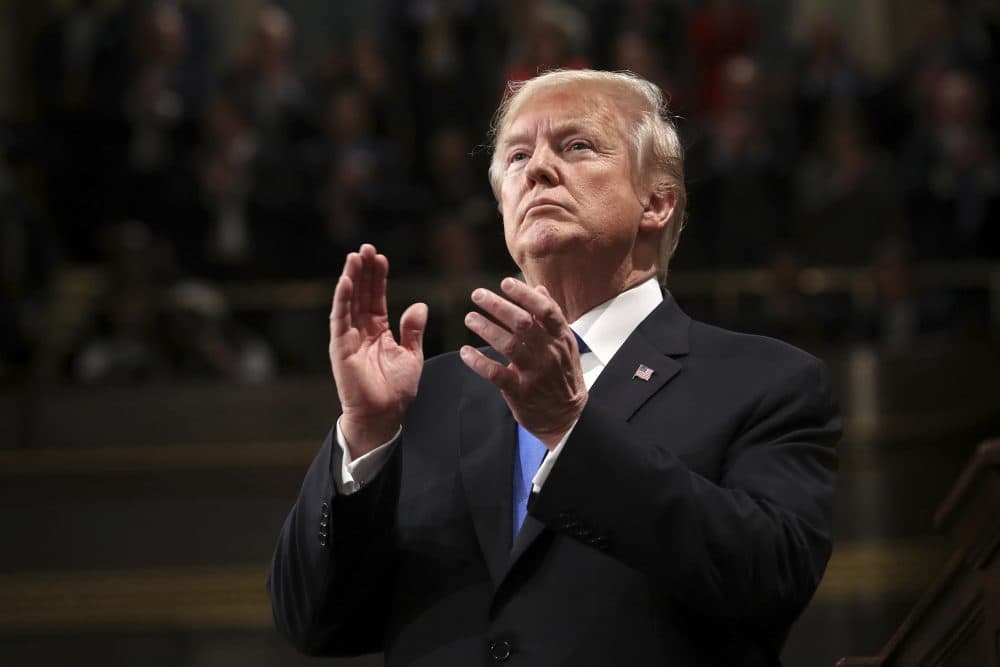Advertisement
commentary
Why The Trump Administration Is Hazardous To Your Health

In the early 1980s, the United States had a higher life expectancy than most other high-income countries. Today, Americans live shorter lives than the populations of all other economically comparable countries, as well as the populations of countries we do not normally compare ourselves to, like Chile, Cuba and Singapore. The U.S. is also sicker than other high-income countries, with a higher mortality rate from a broad range of diseases, including non-communicable diseases like heart disease and cancer.
Our increasingly poor health is especially frustrating, given that we spend more on health care than any other country in the world. But health care is not the same as health. Doctors and medicines take care of us after we have become sick, but our risk of becoming sick in the first place is shaped by the social, economic and environmental conditions around us. The air we breathe, the water we drink, our education and, especially, our income, are all part of the broader context in which we live, which determines our ability to live a healthy life.
We are healthy because we have the money to afford nutritious foods. We are healthy because we have safe outdoor spaces where we can exercise without fear of violence or crime. We are healthy because we received a good education, which paved the way for us to secure well-paying jobs and make healthy choices. If we lack access to these resources, then all the medicine in the world can make little difference. Whether or not we enjoy such access is primarily a matter of politics.
The air we breathe, the water we drink, our education and, especially, our income ... [determine] our ability to live a healthy life.
In the U.S., our politics have largely failed us when it comes to creating the conditions that allow us to be healthy. This failure began in the 1980s, when we started to disinvest in the policies and institutions that foster health.
In his inaugural address, Ronald Reagan famously said, “government is the problem.” His election represented a growing belief among Americans, especially conservatives, that government meant inefficiency and waste. During his term, Reagan worked to minimize government across the board, through steps like deregulating the financial sector, weakening the Environmental Protection Agency and rolling back health-and-safety standards. Taken together, this trend of reducing government’s role in maintaining the public good, which continued through subsequent administrations, undermined health by undermining the conditions that allow health to flourish. Reagan’s economic legacy, in particular, deepened financial inequality, which has, in turn, deepened health inequality.
Money buys access to the resources we need to live a healthy life; as financial inequality has grown, so has the life expectancy gap between those at the top of the economic ladder and those at the bottom. At present, the richest 1 percent of Americans can now expect to live 10 to 15 years longer than the poorest 1 percent.
Advertisement
As aggressive as Reagan’s rollback of government was, President Trump makes him look positively tentative by comparison. Trump began by appointing cabinet secretaries who had, in the past, voiced skepticism about the mission of the departments they now run.

Betsy DeVos, the current secretary of education, has long been an advocate for school choice; since her appointment, she has worked to cut public school funding in favor of voucher programs.
The Department of Housing and Urban Development, under Secretary Ben Carson — who, in a radio interview, once appeared to liken public housing to communism — is now reportedly considering imposing work requirements for housing aid, and raising rents.
Environmental Protection Agency Administrator Scott Pruitt has presided over sweeping regulatory rollbacks, making it easier for companies to pollute, and harder for the U.S. to keep air and water safe, and tackle the urgent problem of climate change.
Quality public education, fair housing and a clean environment are all necessary conditions for health. The damage the Trump presidency has done in these areas is just a fraction of the broader harm his policies have caused by steadily eroding our government’s ability to safeguard well-being. We are now in a position where our health is worse than it should be, and our government is taking steps to set us even further back.
Unfortunately, the damage Trump has done to the conditions that shape health in America is seldom part of the public conversation about his policies. When we talk about the Trump administration’s effect on health, we mainly talk about its attempt to repeal the Affordable Care Act. Yes, repealing the health care law would be a tragedy; it would unnecessarily re-expose millions to the danger and instability of living without health insurance. But the law is not our air, our education, the roof over our head or our economic prospects. It is not the world around us — the world the Trump administration threatens with nearly every action it takes.
At present, the richest 1 percent of Americans can now expect to live 10 to 15 years longer than the poorest 1 percent.
We will feel the health effects of these actions for years to come, just as we are still living with Reagan’s health legacy. There is, however, one area where the Trump administration is already affecting health in the short-term. The president’s words and actions have steadily chipped away at the norms of public civility that bind us together, starting with his inaugural address about “American carnage,” and continuing with his tolerance for ethnic and religious hatred, and his persistent disavowal of efforts to bring about gender equity. This creates an opening for those who would sow hate, and act on that hate, threatening the health of immigrants, minorities and the poor. It also paves the way for legislation that marginalizes those who are most in need of our compassion, and the assistance that only robust federal programs can provide.
More than a year into the Trump era, the diagnosis is becoming clearer and clearer: This administration is hazardous for health. It has taken some of the unhealthiest ideas in our country’s political history, and doubled down on them, dismantling the institutions tasked with protecting the resources that create health, and poisoning the public sphere with hate. This is even before taking into account the GOP’s recent tax bill, which threatens to exacerbate economic inequality, deepen health gaps, and reverse health gains.
As ubiquitous as Trump seems now, the health consequences of his time in office ensure that his influence will likely remain with us for decades to come, shaping our health, and our children’s health, long after his name has left the headlines.
